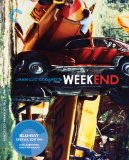| Reviews & Columns |
|
Reviews DVD TV on DVD Blu-ray 4K UHD International DVDs In Theaters Reviews by Studio Video Games Features Collector Series DVDs Easter Egg Database Interviews DVD Talk Radio Feature Articles Columns Anime Talk DVD Savant Horror DVDs The M.O.D. Squad Art House HD Talk Silent DVD
|
DVD Talk Forum |
|
|
| Resources |
|
DVD Price Search Customer Service #'s RCE Info Links |
|
Columns
|
|
|
Weekend (1967): The Criterion Collection
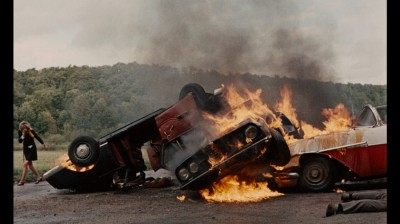
Please Note: The images used here are taken from stills provided by The Criterion Collection and promotional materials, not the Blu-ray edition under review.
"On ne peut dépasser l'horreur de la bourgeoisie que par plus d'horreur encore." ("You can only overcome the horror of the bourgeoisie with more horror still.")
A culminating and transitional work, Godard's 1967 opus Weekend capped a near-decade in which this possibly greatest of French filmmakers had been madly prolific, making an average of about two experimental, searching, wildly diverse, restlessly intellectual sort-of-narrative features per year. (Reflecting their maker's ravenous appetite for cinema, these ranged far and wide, from the 1962 musical comedy Une Femme est une femme to the sci-fi of 1965's Alphaville to the road-trip romance Pierrot le fou and far beyond -- all recognizably Godard's, despite their rapacious, sardonic genre pillaging.) From the get-go, with his first feature, Breathless, Godard had questioned the most basic assumptions of cinema-as-storytelling, and a political radicalization that flowed in tandem with that highly informed, skeptical artistic temperament began to emerge more and more forthrightly in his films, with Weekend representing the place where an uneasy relationship between the director/former critic's worship of classical Hollywood cinema and his more and more urgently felt far-left politics finally, inevitably broke down. It was, ostensibly, to be Godard's last film to even pretend to have a summarizable story or need international co-production financing or movie-star actors to get made; it represents his no-love-lost, middle-finger-raised kiss-off to a kind of cinema and a means of making it indelibly stained by what Godard at this point bluntly saw as deplorable, irredeemable consumer capitalism. But instead of imploding or bogging down in ambivalence as it could have under the strain of such end-of-the-line contradictions, Weekend is a virtuosic display of the cinematic mastery and nonstop, skin-of-his-teeth inventiveness with which Godard had earned his international standing. It's easily the most harrowing, demanding film Godard had yet made, and incendiary (literally and metaphorically) to the nth degree, but even as they do their best to burn down the corrupt medium itself, the flames of Godard's enraged, denunciating inferno create some of the most beautiful, intense, ingenious, and accomplished images ever put to film.
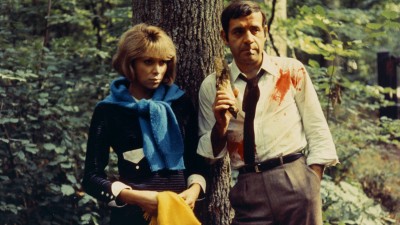
The two figures (and, as in many if not most of Godard's films, they are better described as figures than as "characters") at the center of Weekend are a murderous pair of extremely shallow, hostile upper--middle-class marrieds, Roland Durand (Jean Yanne, This Man Must Die and his wife, Corinne (French comedy star Mireille Darc), both of whom are conducting affairs with others and each of whom plans to bump off the other and reap a huge inheritance just as soon as Corinne's wealthy mother dies. It's in the interests of carrying out plans to hasten this demise that the two speed off for the weekend road trip, on which they plan to pick up Corinne's mother for a ride to a clinic they don't mean for her to ever reach. But what they reap is the proverbial whirlwind caused by what Godard goes to great, brilliant lengths to illustrate is the society-wide, innately toxic dominance of their horrifically misanthropic, self-obsessed attitudes. One of the first things we see (in an extreme high-angle shot from Corinne's POV on her luxury apartment's balcony, as she flirts with her psychoanalyst lover and speaks of the hoped-for death of her mother and husband with in the same nonchalant tone she uses to mention the brawl below) is a car-related altercation. For Godard, the automobile does not signify anything liberating or pretty: After a semi-slapstick, cartoon-violent fender-bender and run-in with their equally nasty, vapid neighbors, Corinne and Roland honk and barge their way through the longest traffic jam ever (the film's most famous sequence, a conceptually and technically awesome tracking shot that seems endless in the best possible way as the camera glides gracefully by a parade-like travesty of all of modern society); ceaseless cries and screams, abandoned crashed cars, frantic vying to get ahead, those ceaseless horns, and the general fulmination of a car-addicted society loudly and destructively going nowhere fill the screen for a good 10 minutes. When Corinne and Roland predictably crash after running anything that gets in their way off the road, it creates a spectacularly hellish blaze (Corinne dramatically mourns her Hermès handbag), and from then on, abandoned cars, smashed beyond recognition or in flames, surrounded by dead motorists, are a common sight in the film -- a forebodingly transfixing, evocative symbol of a Western-world consumption-war-profit cycle that, depicted in this way, is ultimately as self-immolating as threatening to anything else.
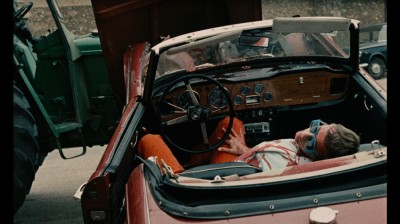
Once they're carless, Roland and Corinne become a sort of quibbling Laurel and Hardy, bumbling toward what's sure to be a miserable end through this post-apocalyptic landscape littered with automobile husks and human corpses. They encounter specters of the past -- the French Revolutionary Saint-Juste (played, in one of two roles he has here, by Jean-Pierre Léaud (Masculin-Féminin, The 400 Blows); versions of Tom Thumb and Emily Brontë who, one of the film's copious, insouciant intertitles tells us, are being filtered through the lens of Lewis Carroll, making Roland and Corinne little Alices (though contemptuous, and with infinitely less sincere curiosity) -- and are on the whole surrounded by Mad-Hatter revolutionaries and cultural artifacts that, having nothing to do with a bottom line or a new purchase, puzzle and anger them. (Anyone familiar with Godard will recognize and appreciate the running, punning commentary provided by the intertitles; they're amusingly self-deprecating, too, with one cut-in announcing that we're watching "a film found in a rubbish pile"). The suddenly fantastic, anything-goes world around them is rife with political and cultural history and convulsive ideas, but the laughable, obnoxious Corinne and Roland are impervious. They stare, glum and blank, while two young men they've encountered, an Arab and an African, voice parallel scathing critiques of the exploitative, self-cannibalizing West; they mope and yawn their way through a sonically and visually superb, invigorating 360-degree pan that repeats itself several times as various figures from French life observe and listen as a theory-espousing pianist plays Mozart in a dusty farmhouse courtyard. By the time they've bullied, whined, and stolen their way to Corinne's mother's house and fulfilled their malignant plan, the entire world around the Durands has quite literally gone to hell, and in the end, they encounter and are kidnapped by a group of armed hippie-revolutionaries who fight deadly little guerrilla skirmishes with rival cells, ritualistically recite an 18th-century poem that beckons welcome oblivion from the abyss, and indulge, most disturbingly, in rape and cannibalism, knowing it's the end of the line and, accordingly, succumbing to sheer nihilism. The carnage is, mercifully, mostly implied in a relatively non-graphic way; none of the blood, trauma, or pain that we see is played as strictly "realistic." Yet it is truly harrowing, and it's difficult to tell whether it's despite or because of its self-conscious artifice that the film cuts so deep and troubles so profoundly.
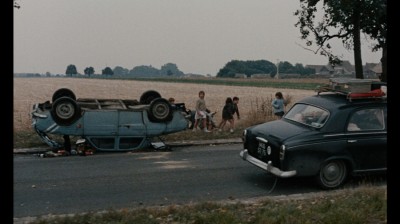
Weekend is anti-realist, absurd, and irrational, but it engages intensely nonetheless, perhaps because it does, after all (and for all its snarling disrespect toward conventional plot/character development), make perfect aesthetic and significative sense, following a philosophical, political, and poetic trail on which the bread crumbs are real clues that do actually lead, one into the next, in a way that gives the film a certain connected wholeness (albeit in a way that would -- and this is part of the point -- have the literal-minded Roland and Corinne Durand tearing their hair out). Aesthetic wholeness does not at all equal a smooth surface here, however; Weekend proceeds down its path in fits and starts, neither ebbing or flowing, instead using those omnipresent, running-commentary intertitles, along with a jarring way of editing the image (by Agnès Guillemot, the New Wave's cutting-room stalwart) and the sound (with Antoine Duhamel's ominous, dirge-paced, decaying-carnival score popping in and out abruptly) to modulate and punctuate what we're seeing, for an experience that, while unfailingly conscientious (Godard's style and technique announce themselves at every turn, but they're never slick or gratuitous), is always fierce, alarming, unpredictable -- never soothing or complacent. The film does offer its own absurdist, pitch-blackly funny, rhyming symmetry, though: Two salient, bookending sections in particular have troubling echoes of one another and draw disturbing, pointed parallels, with the first, near the beginning, played out as an obviously exaggerated erotic tale told by Corinne to her lover; the second, near the end, depicting the abject horror of cannibalistic butchery; and both recognizably featuring a most unappetizing commingling of broken eggs and human flesh that has become, in one way or another, a consumable commodity. The film is not a gracious exit on Godard's part by any means, but it is a grand, unforgettable one; if you can't really tell whether the politicized, malcontented, conscience-stricken auteur means to go out in a blaze of glory or just wants to watch the whole damn thing burn down (it's probably both), it can unequivocally be said that this rancorous, whip-smart burnt bridge of a movie illuminates and sets one's mind alight as it combusts, and you can't take your eyes off of it.
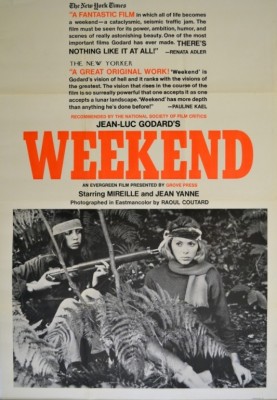
THE BLU-RAY DISC:
It seems safe to say that the fantastic new transfer of Weekend presented on this Criterion Blu-ray edition (AVC/MPEG-4, 1080/24p, at its original 1.66:1 theatrical aspect ratio) makes the film look as authentically good and film-like as we'll ever see it on home video. Raoul Coutard's cinematography and its ways with interior and natural exterior light, the bold colors of clothes and cars and the pastoral greens, the marsh/woods browns in the film's nature shots, and the starkly primary colors of the copious intertitles look warm and clean, with all blacks solid and no edge enhancement, aliasing, or dirt/debris/scratches discernible at any point. A very healthy amount of the film's natural grain/celluloid texture is present, so it well and truly looks the way it should. What's more, a comparison of between the new edition and the prior New Yorker DVD release shows noticeably more of the picture around the edges (it must have seen slightly cropped before), so it's an improvement in that area, as well. Overall, a great transfer job on every front.
Sound:The disc's uncompressed monaural PCM soundtrack does a great job with the sound (always an important element in Godard's films); there may be some distortion in the louder music or screams/yells in the spoken sound, but these are very likely intentional, befitting the film's purposeful excesses, and in any case sound "normal" for a film of this vintage and in keeping with the dynamics of mono movie sound. Otherwise, no hisses, pops, or imbalance mar the aural experience of Weekend on offer here.
Extras:--"Revolutions per Second", an extremely fine 25-minute video essay by cinéaste and critic Kent Jones, on which he brings to bear all of his considerable knowledge and feeling about Godard in general, and Weekend in particular, to give us penetrating analysis, interpretation, and contextualization of the film. This is one of the best extras of its kind I've ever seen.
--A rich seam of chats with those involved in the film includes an interview with cinematographer Raoul Coutard from 2004 (18 min.) in which Godard's longtime DP discussed the fraught, turning-point period in Godard's career that corresponded to Weekend as well as the shoot itself, including some in-depth technical details and juicy anecdotes revealing how tempestuous Godard could be with his actors and crew; a brief, frank interview from French TV with stars Mireille Dark and Jean Yanne from 1968 (3 min.); and finally, an interview with assistant director Claude Miller from 2010 (25 min.), the most up-close-and-personal, revelatory, and detailed rundown of the bunch on what it was like to prepare and shoot Weekend with Godard.
--An eight-minute excerpt from a 1967 episode of the French TV series Seize millions de jeunes, shot by Godard's comrade in cinema, Philippe Garrel, features an incisive onscreen interview/commentary with another Godard colleague, Jean-Michel Barjol, and many scenes from the shoot that actually let us see the master at work, along with offering new perspectives of scenes from the film as we see from the POV of over Godard's shoulder as he directs them. A pricelessly privileged making-of peek.
--Both the film's original French theatrical trailer and original U.S. release theatrical trailer, the latter of which offers some great insight into how Godard was regarded/marketed in the U.S. at the height of his '60s popularity here.
--A heftier-than-usual (40+ pages), gorgeously designed insert booklet includes an essay on the film by critic/author Gary Indiana, the relevant excerpts from Alain Bergala's book Godard au travail: Les années 60, and a compulsively readable 1969 interview with Godard himself (conducted by Jonathan Cott) at the very peak of his radicalized, contrarian phase, dispensing bons mots and epigrams -- about Weekend, his body of work thus far, and the state of the world -- like candy.
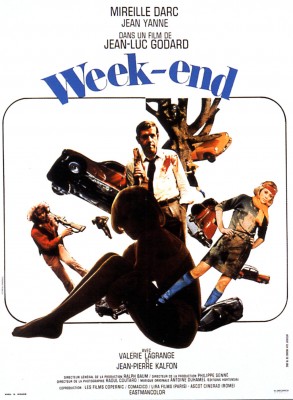
Weekend is the culmination of the first, most popular act in New Wave pioneer Jean-Luc Godard's career, and it's a bridge-burner: Before kicking the door closed on commercial cinema, with its inescapable taint of capitalism, he was going to evoke the terminal, horrific destruction he was becoming convinced all bourgeois culture, including (most) cinema, represented. So he gives us a panoply of masterfully conceived, exhilaratingly original and well-executed sequences that ever more disquietingly depict a petty, inhumanly materialistic married couple's descent into the industrialized-consumerist hell of its own class's making; what all this bravura inventiveness adds up to is a cinematically ravishing, brilliant, and accomplished death knell for the very culture and system of production from which the medium emerged. The misadventures of the film's despicable, murderous bourgeois take them into both the past they've mindlessly demolished and the unbearable future they're creating, both out of human time (unlike the shrill, displeasing presences of the acquisitive couple, the elements of nature -- water, trees, fields, rock formations -- are displayed and scrutinized by Godard's camera lovingly) and deep into the dangerous, reckless, necessary revolutionary spirit of the film's precise late-'60s moment. It's a great film on its own terms -- an almost unbelievably bold, provocative, impassioned statement -- and a great summation of everything Godard had assayed and achieved up to that point; from the very beginning, Godard had strained the limits of what "storytelling" through movies could do, and Weekend is as digressive and fragmented as narrative cinema can get without breaking apart or breaking down (which does actually happen at the end of this film, in the famous "The End...of Cinema" closing title). Breathtaking and bracing, it's decidedly the death of the "early Godard," but it seems to go everywhere and contain everything at once without missing a beat. As such, and despite the resounding note of dismay and despair it strikes with such flair, Weekend is as full of life -- bursting with real, ultimate breathlessness -- as any film ever made. DVD Talk Collector Series.
|
| Popular Reviews |
| Sponsored Links |
|
|
| Sponsored Links |
|
|
| Release List | Reviews | Shop | Newsletter | Forum | DVD Giveaways | Blu-Ray | Advertise |
|
Copyright 2024 DVDTalk.com All Rights Reserved. Legal Info, Privacy Policy, Terms of Use,
Manage Preferences,
Your Privacy Choices | |||||||









